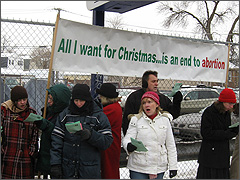I never tire of hearing Christmas carols – even if they’re being piped into stores and malls just to encourage shopping excesses.
But hearing Christmas tunes recently got me thinking: the decorating frenzy of Christmas trees, lights, garlands, poinsettia plants, and Santa Claus statuary often seems devoid of Christian meaning.
What exactly is being celebrated with all the music, décor, and festivity of the season?
 The answer, I think, is that many people are celebrating Christmas traditions and trappings rather than the stupendous event of Christ’s coming to Earth. The content is forgotten, but the glow of Christmases past remains.
The answer, I think, is that many people are celebrating Christmas traditions and trappings rather than the stupendous event of Christ’s coming to Earth. The content is forgotten, but the glow of Christmases past remains.
The chasm between show and substance came home to me from comparing our cheery secular carols to Alfred Reed’s magnificent “Russian Christmas Music” (my gift to you, available on YouTube). In the finale of the closing movement, when the Son of God breaks through eternity into time, leaving his throne in heaven to assume our mortal flesh, and the angelic host fill the sky proclaiming the miracle of Christ’s birth, the music swells to a glorious crescendo of pealing bells, thundering percussion, and brass. This is the kind of music that captures the awesome wonder of Christ’s Incarnation and birth.
Words always fall short of conveying the meaning of this unfathomable mystery. But at the beginning of The Gospel of Life, Pope John Paul II summarized the essential points:
“‘By his incarnation the Son of God has united himself in some fashion with every human being.’ … This saving event reveals to humanity not only the boundless love of God who ‘so loved the world that he gave his only Son’ (Jn 3:16), but also the incomparable value of every human person” (no. 2).
By taking on our flesh – becoming human in all things but sin – Jesus ennobled all human life. Our dignity derives from the truth that God created us in his image, and loves us to the point of becoming man, suffering and dying to win our redemption, and thus allowing the Holy Spirit to dwell in us.
This understanding of human dignity is undermined today by a materialist and dualistic view of the human person. Many people think of the human body as something we inhabit, having no inherent value. Our bodies and others’ can be used for our pleasure. Should a body become burdensome or cause suffering, we can dispose of it.
How one understands the human person – as an insignificant bit player in the drama of one’s life or as a creature loved by God, a unity of body and soul who will live eternally – affects one’s behavior toward others. We can be dismissive of those who don’t contribute to our immediate happiness or we can see them through God’s eyes.
As C.S. Lewis explained in The Weight of Glory: “The dullest and most uninteresting person you can talk to may one day be a creature which, if you saw it now, you would be strongly tempted to worship. … There are no ordinary people. … Next to the Blessed Sacrament itself, your neighbour is the holiest object presented to your senses. If he is your Christian neighbour, he is holy in almost the same way, for in him also Christ … is truly hidden.”
At Christmas gatherings, in long checkout lines, and in overcrowded parking lots, let’s remember that Christ lives in the people around us. Let’s celebrate Christmas with profound gratitude that through his Incarnation and birth, Jesus showed us the meaning of love and the priceless value of every human life.
LifeNews.com: Susan Wills is Assistant Director for Education and Outreach, USCCB Secretariat of Pro-Life Activities. To learn more about the bishops’ pro-life activities, go to www.usccb.org/prolife.







